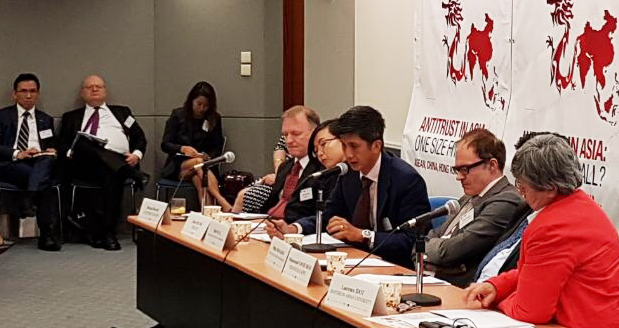Antitrust in Asia Conference 2017: Bid-rigging, Corruption and Competition

At the third edition of the Antitrust in Asia Conference[1], Mr Toh Han Li, Chief Executive of the Competition Commission of Singapore (CCS), took part in a panel discussion titled “Bid-Rigging, Corruption and Competition”. Held in Hong Kong this year, the Conference is jointly organised by ESSEC Singapore and Sorbonne-Assas International Law School with the support of Concurrences Review and Chinese University of Hong Kong.
Competition enforcement and anti-corruption
Mr Toh shared that competition enforcement and anti-corruption are complementary. He cited the example of how corruption can occur when one market player pays bribes to secure an unfair advantage in a competitive market. This runs against the course of what competition law seeks to achieve, which is to ensure a level playing field for market players. All things equal, truly competitive markets will have fewer opportunities and incentives for corruption.
Detection and prevention of corruption and bribery
Mr Toh suggested that by establishing national and international networks of experts from procurement agencies and competition authorities, the exchange of information and experiences can be improved. This can help enhance the detection and prevention of corruption and bribery. Such networks can also help government officials better understand the nuances of bid-rigging and corruption.
Fighting bid-rigging and corruption starts with the public procurement
Mr Toh shared the example of the public sector-wide e-procurement system in Singapore – GeBIZ, which was designed to ensure maximal participation by potential bidders. The system puts in place participation requirements that do not unreasonably limit competition and thereby reducing the possibly of collusion. The transparency on prices also allows easy monitoring and policing by authorities.
CCS has also been actively reaching out to government agencies involved in public procurement to raise their awareness of bid-rigging. In recent years, CCS has seen an increasing number of government agencies which have proactively reached out to CCS to refer cases relating to potential bid-rigging activities, such as where identical tender documents were received by the agency in a public tender.
On this note, an issue that may give rise to concern is affiliated companies submitting separate bids for a public tender as such bidding activities could arguably create a false impression that there is genuine competition in the market when in fact, there is effectively only one tenderer who coordinates pricing among its bidding companies. One potential solution to this may be to require the affiliated companies to disclose their beneficial ownerships and related entities when tendering for public tenders.
Another way to help improve the public procurement process is for competition authorities to work with public procurement officers in conducting training to equip them with the necessary knowledge and skills to identify suspicious signs of bid-rigging. However, there is no one-size-fits-all solution when it comes to fighting bid-rigging and corruption. Improving public procurement rules and procedures are important and key in upholding an open and fair competition network.
[1] This conference delves into the issues raised by the implementation and enforcement of antitrust rules in the Asian countries and offers the opportunity to discuss the hottest topics with some of the most prominent local and international antitrust academics, enforcers, and practitioners.